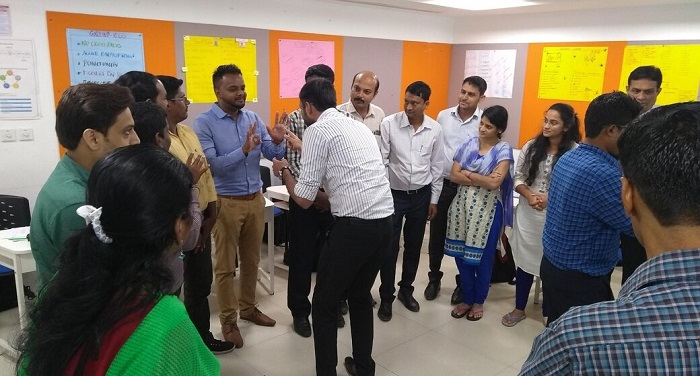About the author: Bijitha Joyce is Lead – Facilitator Development at Tata STRIVE

Learn more about Tata STRIVE courses and its initiatives in skill development – https://nationalskillsnetwork.in/tata-strive/
‘Guru Govind dou khade, kake lagoon pay | Balihari Guru aapne, Govind diyo batay’.
Recently, I hit upon this beautiful verse by Sant Kabir Das. It was in “Shiksha” a book written by Mr. Manish Sisodia, Education Minister, Delhi, which emphasizes the role a trainer or a teacher plays in a learner’s life.
The above quote says, when God and teacher are in front of me, whom will I greet first? I am indebted to you, teacher, for you have shown me the way to God.
This verse is significant be it in the mainstream education or the vocational system. The influence of a trainer or a teacher is immeasurable as its effect stays throughout a student’s life.
Tata STRIVE, an organization working towards skilling the young in our country, firmly believes that trainers in the vocational system are the most influential change agents in transforming learners.
The vocational setting is very different from mainstream education in two ways:
- The time or the duration a trainer gets to transform a student. Unlike schools and colleges, a trainer only gets around three months to two years, depending on the course duration to interact with the youth and it is quite a short window.
- It is a skilling program preparing the youth for jobs or self-employment. In reality, it is not just preparing them for the first job, but a career span of another 40-50 years. Employers are not looking for just certificates but skilled professionals from the very start. Look at it like two different words ‘skilled’ and ‘professionals’. Skilled in their technical space, and with life or employability skills making them professionals.

Given both these practical scenarios, a trainer in a vocational setting is required to wear multiple hats during the course duration. One has to play the role of a trainer, mentor, coach, and even a first-time supervisor. Besides, given this short duration, that is a twin challenge.
Skilling organisations may have excellent physical and digital infrastructure, latest and relevant content. However, if the last mile delivery is compromised, then the future of our young learners is also compromised.
To address this challenge and ensure our youth is ready to create their own professional life, a trainer in the vocational setting need to understand that:
- Most of the youth come from disadvantaged and difficult backgrounds and may have had disturbing experiences like abusive parenting, unpleasant neighbourhood, low sustenance, and the like. Hence, they already may come with lower levels of self-esteem and self-confidence.
‘Jab log English mein baat karte hain, tho dar lagta hain’ .
‘Galtiya karenge tho log dat – the hain, tho jitna bolte hain utna hi karna chahiye’.
- Most of them are school dropouts, their learning styles, and hence the retention of these learning calls for a unique approach and not just training for knowledge and skills.
‘School mein question poochthe tho teacher daathe the, yaan class ke bacche mazaak udaate thein’
‘school mein teacher sirf padhai karne wale bachho par dhyaan dete hain’
Related article: Facilitators who strived their way to success by developing a skilled workforce – Read more: https://nationalskillsnetwork.in/facilitators-who-strived-their-way-to-success-by-developing-skilled-people/
In our experience, so far, of training around 5000 trainers in the skilling space, we have observed that when trainers imbibe these four key pointers given below, they are truly able to empower their young learners.
- Build a safe and respectful environment: Be it new or experienced trainers, cultivating and sustaining meaningful positive relationships with youth is the key. It opens up an environment to ask questions without being judged, share opinions without fear and accept feedback for improvements. It is for the trainer to devise ways to build such safe environments. However, is this possible given the short duration? A very big and confident yes! There are ways and techniques to build such environments be it in the physical or digital classrooms. Trainers at STRIVE are encouraged to practice an inquiry-based approach, coaching conversations, and activities like a safety net to build a safe and respectful learning environment.
- Practice inquiry-based approach: Recently, Tata STRIVE invited Ms. Vinisha Uma Shankar, a child prodigy who invented a solar-powered ironing cart and was awarded the Children’s Climate Prize conferred by the Children’s Climate Foundation from Sweden along with her mentors as speakers for our chat show ‘Dialogue Matters’. Her mentors constantly emphasized that they encouraged Vinisha to search for answers on her own. We believe that trainers who engage in different learning methodology, which appreciates research on a topic, interactions with different stakeholders, projects to be worked upon, team discussions, opportunities to reflect are preparing the youth for their career. Tata STRIVE runs programs to upskill trainers to use an inquiry-based approach and project-based methodology in their delivery.
- Empower youth through coaching conversations: Well, this is a new concept in the vocational space. Typically, it is the creamy top layer in the corporate world that gets exposure to this powerful and effective development tool called coaching. Usually, one associates the word ‘coaching’ with either coaching classes for competitive exams or sports coaching. The coaching being referred here is different.
Tata STRIVE believes that a trainer also needs to play the role of a coach, not a Sports Coach or a Life Coach but an ‘Employability Coach’ and ask questions to trainees (youth) to find solutions to their challenges.
Let us not forget that we are molding the future leaders and they would require constructive feedback, appreciation of their efforts, techniques to set goals, and more importantly building accountability to accomplish their set goals. I am happy to share that our learners who experienced coaching during the course have taken accountability for their professional development, techniques to resolve their own internal and external conflicts in their journey, break some self-limiting beliefs and see progress in their career.
Coaching is all about asking questions and is different from training and mentoring. I am sure you are curious to know more about Coaching. Please click HERE to know more about coaching.
- Invest in your professional development: It is said ‘every great teacher is a great learner’, therefore having a lifelong learning mindset is an essential ingredient in becoming an effective influencer. As a vocational trainer, one is also required to develop skills in mobilization; counseling youth to make informed career choices; managing stakeholder expectations be it parents, employers, community, or internal stakeholders; ensuring placements, and providing post-placement support. As per the latest research study supported by NSDC, “Trainer effectiveness in the Indian skills ecosystem” a study commissioned by the British Council and supported by the Alliance of Skill Training Partners: July 2020, around 68-70% of trainers reported advancement in their career as one of their drivers of motivation and this cannot happen unless one carves and designs their learning journey.
For skilling organizations, research by the Association for Talent Development found that organisations that offer professional development opportunities to their trainers are more likely to be top performers relative to their competitors. Organisations need employees who are just not trainers but change leaders /partners with leadership and project management skills to lead and influence change in the youth and other stakeholders in the skilling ecosystem.














Comments 1